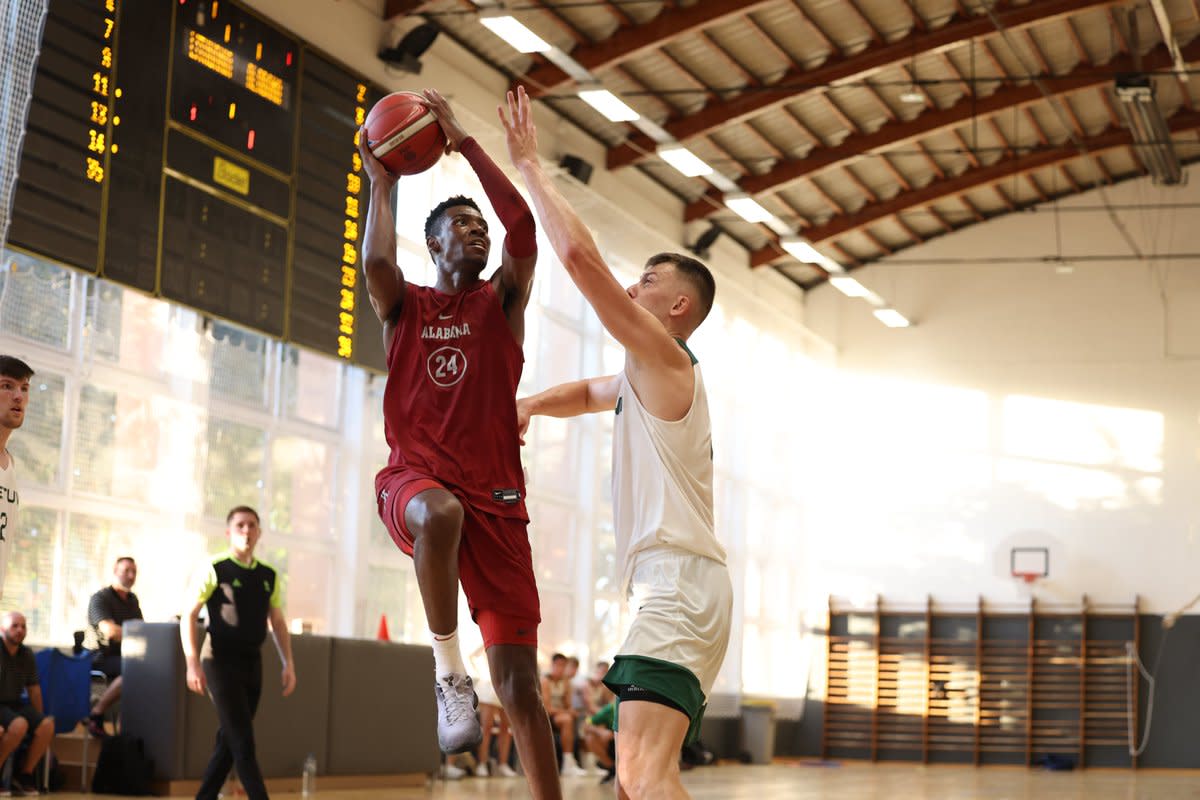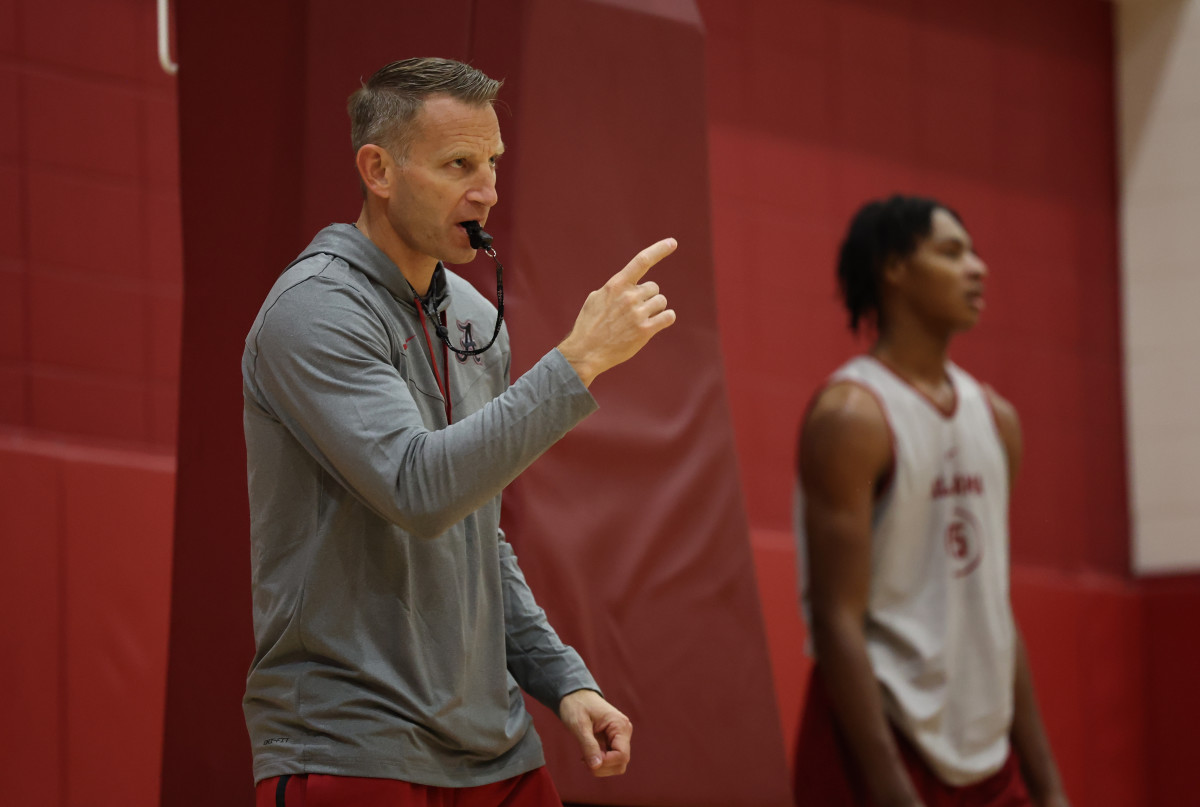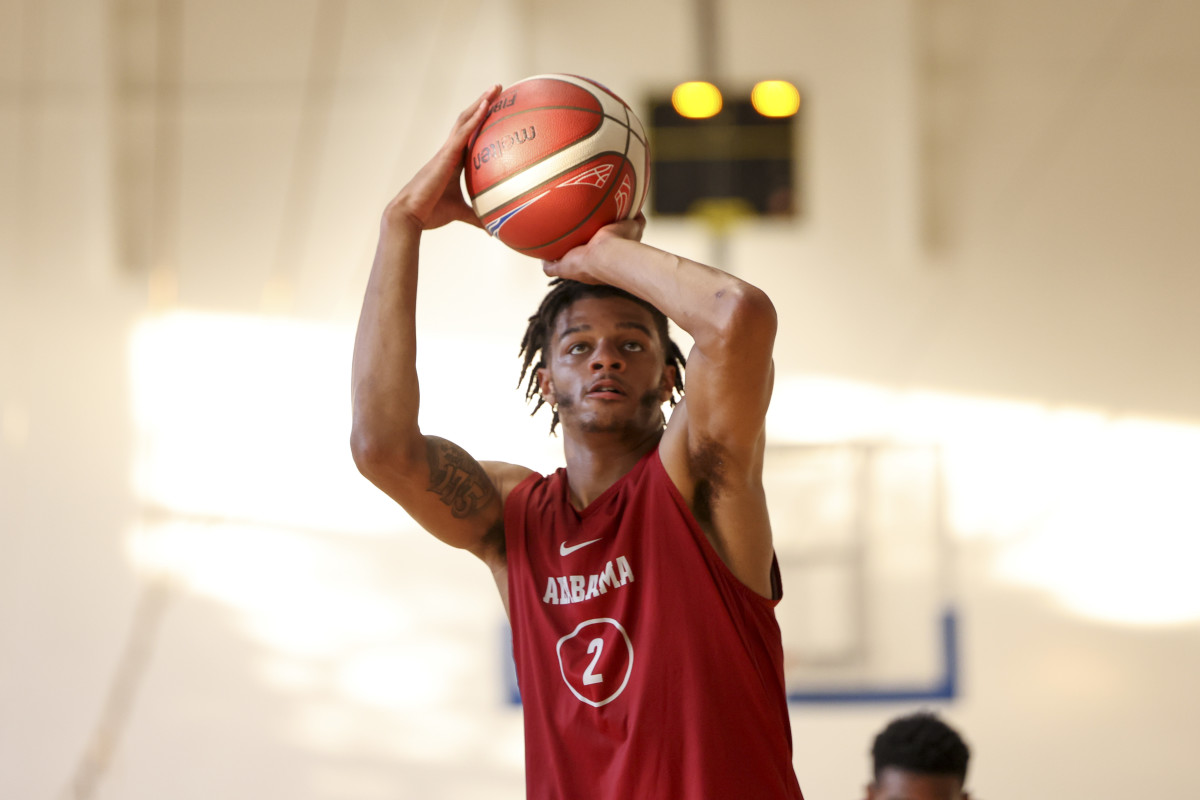Summer Vacation: What Alabama Basketball Learned on its European Tour
It's no secret that the 2021-22 season was a disappointment for Alabama basketball.
After amassing an overall record of 19-12 during the regular season, the Crimson Tide was knocked out of the SEC Tournament in its first game, falling to 11-seed Vanderbilt. Eight days later, 6-seed Alabama was ousted from the NCAA Tournament in the First Round, this time by 11-seed Notre Dame.
While the Crimson Tide ranked 16th in adjusted offensive efficiency according to KenPom, the team finished 92nd in adjusted defensive efficiency — an incredible fall from its 2020-21 season that saw Alabama reach the Sweet 16 and record a defensive efficiency that ranked third.
This season, though, Nate Oats and his Crimson Tide are looking to get things back to the way they used to be: an aggressive, defense-driven team that can also shoot the lights out.
This summer saw the beginning of the renewal process for Alabama basketball when the team went on a European Tour. Over a 10-day stretch in August, the Crimson Tide defeated the Spain Select Team in Barcelona by a score of 108-64 before traveling to Paris, France. There, Alabama downed the Lithuania Men's B Team 120-61 before beating the Chinese National Team — a team ranked No. 29 in the world according to the FIBA rankings — by a score 89-77.

It was certainly an impressive trip across the pond, and one that gave Alabama fans multiple reasons for excitement. To Oats and the Crimson Tide, though, it taught them several lessons that the team aims to bring with them as it begins preseason practices this week.
“I learned that we’ve got a chance to be really good,” Oats said during his first preseason press conference on Monday morning. “We’ve got depth, we played harder on defense, thought we were more connected — more guys pulling for each other — unselfishness was pretty good, Brandon [Miller] can score the ball. He wasn’t the only one that played really well. I thought Nimari [Burnett] had a great trip over there, Dom Welch started coming around some — saw he’s got some veteran qualities and some experience to him."
Oats began to discuss his learning points from Europe by calling out specific players for their accolades. First up was freshman forward Brandon Miller, the No. 1-ranked prospect in the state of Tennessee during his senior year of high school. In Alabama's three games overseas, Miller led Alabama in points in all three games, averaging roughly 22 per game.
Sophomore guard Nimari Burnett is someone that Crimson Tide fans have waited a long while to see. Fully recovered from his knee injury that he suffered last summer, Burnett recorded 13 points and four rebounds against China and earned enough 'Blue Collar' points to earn himself the coveted Hard Hat Award.
It's good to have you back, Nimari 👷@NimariBurnett #RollTide | #BlueCollarBasketball pic.twitter.com/DN1oLV5sy9
— Alabama Men’s Basketball (@AlabamaMBB) August 12, 2022
And finally, Oats highlighted graduate-student guard Dom Welch, who transferred to Alabama from St. Bonaventure in the offseason. Against Lithuania, Welch recorded 11 points and 10 rebounds for a double-double.
With Oats noting the standout performances from the fresh faces on the team, sophomore center Charles Bediako said that what he learned most from the summer was that every individual player on the roster can be their own special kind of productive.
“What I learned about this team — especially going on the Foreign Tour — is everybody can play,” Bediako said. “Everybody is very productive in their own way. It’s going to be hard for the coaches to see who to put in because everybody can play. We’re definitely young, but you know guys are hungry, though. Like, when we were playing overseas, guys didn’t fear that teams were older than us. They didn’t care about that.
"But we all just went in, just gave what we got and played our role and you know, I think that’s the main part that really helped us come out successful in that foreign trip and it also brought us closer together as a team.”
Last season, one of Alabama's biggest strengths was simultaneously one of its most critical weaknesses: the ability to shoot the basketball. When the team shot red-hot, the Crimson Tide was capable of beat almost anyone, anywhere — including Gonzaga in Seattle along with Houston and Baylor in Tuscaloosa.
That strength that led to multiple key wins for Alabama also led to a crucial weakness: that when the Crimson Tide's shooting cooled down, its chances of winning basketball games dramatically decreased. As noted earlier, Alabama's defensive efficiency ranked 92nd in the nation, and when a poor offense combines with a porous defense, disaster ensues.

With Alabama having to rely on players shooting lights-out from beyond the arc in order to survive in close games, it's no wonder that their season ended in an early exit. However, Oats fully recognizes that his team's focus on offense was a primary part of its problems.
To him, the foreign tour proved that this year's team has the potential to be capable of winning any game, not just the selective ones that the team shoots well in.
“What we did well: I thought defensively we were a lot better over there," Oats said. "We shot the ball better in the first couple of games. I don’t know if it was because it was the third game or just because we hadn’t really been in the gym for a week by the time by the time we played the third game and our guys are guys that live in the gym all the time, so those guys need to shoot every day outside of practice to really stay on top of their shooting. But we didn’t shoot it well against China who by far and away was the best team we played and we still won. If we had taken care of business in the fourth quarter we should have won by 20-plus.
“So we learned we can get wins without shooting the ball well, which is something we need to be able to do. You know last year, we didn’t have many games where we shot poorly and still won the game. When you go 3-for-30 against Kentucky, we didn’t even have a chance to win. So hopefully this year a) we shoot it a lot better because I do think we have better shooting, but if we have a game where we don’t shoot it well we can still win the game by doing some other stuff. Our defense is great, our offensive rebounding is great, we don’t turn the ball over as much and get more shots up. I think we learned that about them."
Signs of improvement on the defensive end of the court weren't the only positive lessons learned in Europe for Alabama basketball. While cultural immersion was an off-the-court benefit cited by multiple players, communication and growth of team culture also took a significant step forward.
A frequently-cited shortcoming for the Crimson Tide last year was its lack of communication on the court. Too often that poor communication led to turnovers — a stat that plagued Alabama over the course of the season, ultimately be a key stat in many of the team's losses. This season, though communication has been a key focus of Oats and his players, which was ultimately a reason that the team scheduled the trip in the first place.
And what place could be better to form team bonding than a foreign country? Junior forward Darius Miles couldn't agree more.
“It was a great trip,” Miles said. “We got to talk about a lot of things like life situations, we got to spend time outside of basketball just seeing what people like. We had great laughs and it helped us talk more because communication last year was kind of a big part of our defensive lapses. It helped us communicate better on the floor, so I’d say the chemistry building off the court in Spain helped us communicate on the floor.”

That communication provides a perfect segue to our final topic of discussion. We've talked about the positive lessons that Alabama learned on its European tour, so now it's time to hear what Oats had to say that his team could learn and grow from.
First and foremost, turnovers are a problem that the Crimson Tide needs to correct. Last season, Alabama had the fifth-most turnovers in the Southeastern Conference with 466 — just 14 less than conference leader LSU. Combine that with a steal/turnover ratio of 0.5, and losing the basketball was a big concern in 2021-22.
The aforementioned defense efficiency (or inefficiency, rather) being corrected this season could certainly help the team improve its steal/turnover ratio. However, reducing the amount of turnovers that the team makes during sloppy play and/or poor communication would also go a long way to solving the issue.
With Miles talking about how team chemistry and culture both grew as a result of the foreign tour, the groundwork has been laid for both of those improvements. Combine that with a much deeper roster than last season, and Oats will find it much easier to hold players accountable by withholding minutes from them.
“What do we need to get better at?” Oats said. “There’s a lot of things, I think. We need to make sure we don’t turn the ball over — you know, we’ve got to take care of the ball. We’ve got to continue to get better on defense. We were better than last year. We weren’t better than the year before. We weren’t as good as we were in Year 2 on defense yet. We’ve got a long ways to go to get there, so we’re just going to continue to work on the defensive side of the ball and make sure that we’re trying to progress to get back to be like the top — I mean, we were third in the country in defensive efficiency. We’re going to try to be top-five — we certainly can’t be 92nd or whatever we were last year. We’ve got to be a lot better than that.
“So that’s going to be a huge point of emphasis every single day all year. Just how good can we be on defense, how connected can we be. Our depth is a lot better, so we can hold guys a lot more accountable to play defense. If you’re not going to guard, we’re just not going to play you. So we’ve got 12 scholarship guys, 11 of them are practicing right now with [Jahvon] Quinerly out. I can play all 11 of them significant minutes and if you’re not going to guard, you’re not going to play very many minutes. So that’s what the message is going to be all year long this year.”
There's certainly a long way to go before the Crimson Tide open its 2022-23 season against Longwood inside Coleman Coliseum on Nov. 7. However, it's very evident that Oats, his coaching staff and his players all learned valuable lessons while overseas.
Defensively, the team appears to have improved. The decision-making and shot-making has been more consistent. Communication and culture were fostered and developed. And, arguably most importantly, the players and the coaches were aware of flaws to work on even before their first practice took place on Monday.
The plans have been put into place, and now it's time for the team to execute those plans via preparation in practice.
One final game on the Foreign Tour (tonight vs. China at 7:30pm CEST)! Let’s have some more fun! 🤩🥳#RollTide | #BlueCollarBasketball pic.twitter.com/ALNbTFEh3a
— Alabama Men’s Basketball (@AlabamaMBB) August 12, 2022
